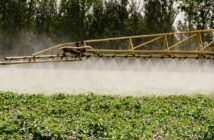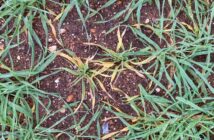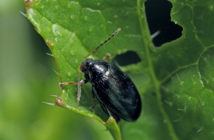EFSA and the EU Member States have finalised the re-assessment of glyphosate, a chemical that is used widely in pesticides. The report concludes that glyphosate is unlikely to pose a carcinogenic hazard to humans and proposes a new safety measure that will tighten the control of glyphosate residues in food.
The conclusion will be used by the European Commission in deciding whether or not to keep glyphosate on the EU list of approved active substances, and by EU Member States to re-assess the safety of pesticide products containing glyphosate that are used in their territories.
A peer review expert group made up of EFSA scientists and representatives from risk assessment bodies in EU Member States has set an acute reference dose (ARfD) for glyphosate of 0.5 mg per kg of body weight, the first time such an exposure threshold has been applied to the substance.
Jose Tarazona, head of EFSA’s Pesticides Unit, said: “This has been an exhaustive process – a full assessment that has taken into account a wealth of new studies and data. By introducing an acute reference dose we are further tightening the way potential risks from glyphosate will be assessed in the future. Regarding carcinogenicity, it is unlikely that this substance is carcinogenic.”
The peer review group concluded that glyphosate is unlikely to be genotoxic (i.e. damaging to DNA) or to pose a carcinogenic threat to humans. Glyphosate is not proposed to be classified as carcinogenic under the EU regulation for classification, labelling and packaging of chemical substances. In particular, all the Member State experts but one agreed that neither the epidemiological data (i.e. on humans) nor the evidence from animal studies demonstrated causality between exposure to glyphosate and the development of cancer in humans.
EFSA also considered, at the request of the European Commission, the report published by the International Agency for Research on Cancer (IARC), which classified glyphosate as probably carcinogenic to humans.The evaluation considered a large body of evidence, including a number of studies not assessed by the IARC which is one of the reasons for reaching different conclusions.
As well as introducing the ARfD, the review proposed other toxicological safety thresholds to guide risk assessors: the acceptable operator exposure level (AOEL) was set at 0.1 mg/kg body weight per day and an acceptable daily intake (ADI) for consumers was set in line with the ARfD at 0.5 mg/kg body weight per day. Dr Tarazona added that EFSA will use the new toxicological values during its review of the maximum residue levels for glyphosate in food, which will be carried out in cooperation with Member States in 2016.
Next, the EFSA conclusion will inform the European Commission in deciding whether or not to retain the substance on the EU’s list of approved active substances. This is a condition for enabling Member States to authorise its continued use in pesticides in the EU.
Nick von Westenholz, CEO of the Crop Protection Association said, “We are pleased to see that EFSA concurs with the numerous health assessments conducted by public authorities on glyphosate over the past 40 years which have all concluded that, when used correctly, it poses no meaningful risk to human health.”
“As an industry we take pride in the fact that our products are demonstrably safe. Pesticides are amongst the most heavily regulated products in Europe and it currently takes about ten years, costing over £150m to bring an active ingredient to market. It is this process, backed by effective and independent regulatory scrutiny, that ensures the public can have absolute confidence in our products.”
“Glyphosate is an important part of a farmer’s and gardener’s toolbox. It is particularly important in minimising food waste by controlling a broad spectrum of weeds and therefore reducing the need for ploughing of soils. This protects soils from degradation and reduces greenhouse gas emissions and energy consumption. This is just one example of how modern farming relies on innovations in crop protection such as glyphosate to protect soil whilst helping make our land as productive as possible.”
NFU Scotland Policy Manager Peter Loggie said, “Glyphosate is one of the most important tools in the Scottish farming sector’s armoury of plant protection products and has been successfully and safely used to control weeds for some considerable time. In welcoming this review, it was hugely important that any decisions on the product’s future use and availability were based on all the scientific evidence accumulated on the product and made on the basis of risk and not hazard.”
“We await the views of experts on what impact any new ‘exposure limit’ safety measure for food may mean. We know that glyphosate is already one of the most monitored plant protection products in modern day use with foodstuffs regularly checked for residues. We would hope that any new residue limits do not generate a barrier to the safe application of glyphosate in the field in accordance with recommendations, and that this important product continues to be available to Scottish farmers in the future.”



